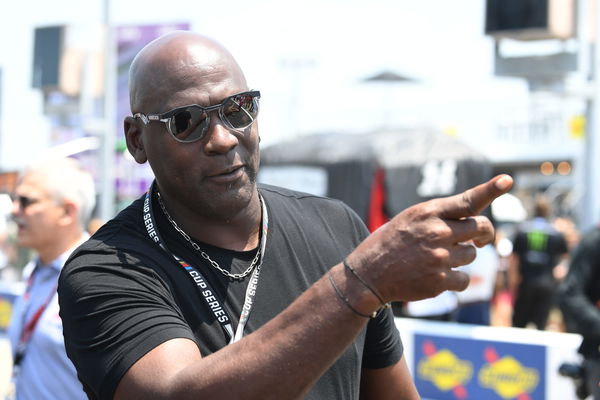76ers Icon Shares Empathy for Kevin Garnett, Patrick Ewing, and Gary Payton – Here’s Why

Follow Us

via Imago
Bildnummer: 07320391 Datum: 07.02.2011 Copyright: imago/Icon SMI 7 February 2011: Boston Celtics power forward Kevin Garnett (5) questions a call by referee Kane Fitzgerald (35) against the Charlotte Bobcats during an NBA basketball game at Time Warner Cable Arena in Charlotte, North Carolina on February 7, 2011. PUBLICATIONxINxGERxSUIxAUTxHUNxRUSxSWExNORxONLY Icon32911020745; Herren Basketball USA NBA Aktion xo0x vdig xub 2011 quer Image number 07320391 date 07 02 2011 Copyright imago Icon Smi 7 February 2011 Boston Celtics Power Forward Kevin Garnett 5 Questions A Call by Referee Kane Fitzgerald 35 Against The Charlotte Bobcats during to NBA Basketball Game AT Time Warner Cable Arena in Charlotte North Carolina ON February 7 2011 PUBLICATIONxINxGERxSUIxAUTxHUNxRUSxSWExNORxONLY men Basketball USA NBA Action shot xo0x Vdig xub 2011 horizontal
The legendary player for the Philadelphia 76ers amassed 12,546 rebounds throughout his NBA career. However, he pulled off the biggest rebound when he was done playing, with his unique ability in a TV studio. Shortly after joining TNT in 2000, the legend released a book in which he showed off his wealth of basketball wisdom. In one particular chapter, he touched on the careers of Kevin Garnett, Patrick Ewing, and Gary Payton.
Though they all achieved notable individual success, the 76ers legend expressed pity for these individuals, explaining what he thinks was missing from their illustrious careers.
1993 MVP said “I feel bad for Kevin Garnett, Patrick Ewing, and Gary Payton”
ADVERTISEMENT
Article continues below this ad
Charles Barkley, an NBA legend and Inside the NBA TV analyst, has a very loud personality, which is partly why he is admired by so many people around the world. When he was asked how he did so well in the Olympic trials, Chuck famously said that while playing against top-level players is difficult, it is also easier to play alongside good players. He felt that not every player in the league was as lucky though.

via Imago
Aug 1992: Chris Mullin (L), Charles Barkley (M) and Magic Johnson (R) of Team USA, the Dream Team, on the victor’s podium after winning the gold medal in the men’s basketball competition at the 1992 Summer Olympics in Barcelona, Spain. (Photo by Icon Sportswire)
Whether it’s pointing out mistakes or giving players the credit they deserve, Charles, in his book “I May Be Wrong But I Doubt It,” opened up a great deal about the intricacies of a career on the hardwood.
Trending

Billionaire Michael Jordan’s Drink With Derek Jeter Was Enough for Yankees Legend to Invest in $11.69 Billion Worth Industry
May 03, 2024 01:00 PM EDT

Shaquille O’Neal and TNT Co-Hosts to Part Ways After 13 Years? Analyzing “Inside the NBA” Hurdles That Might End an Era
May 04, 2024 02:30 PM EDT

Brittney Griner Blasts WNBA for Ruining Angel Reese and Kamilla Cardoso’s Debut: “In No World Does It Make Sense…”
May 04, 2024 01:10 PM EDT

Ty Lue Doesn’t Want To Coach Lakers & LeBron James As Billionaire Steve Ballmer’s Charm Traps 47YO Veteran
May 04, 2024 06:42 AM EDT

“Transferring? Hell Yeah”: Nika Muhl Gets Blunt on Fights With Geno Auriemma After 4 Years of Loyalty to UConn
May 04, 2024 09:02 PM EDT
Get instantly notified of the hottest NBA stories via Google! Click on Follow Us and Tap the Blue Star.

Follow Us
Notably, he expressed sympathy for Kevin Garnett, Patrick Ewing, and Gary Payton. He believes those three NBA legends did not receive adequate support from their teammates.
“If you’re playing with other great players, guys who can all haul their part of the load, all you have to do is play. That’s why I feel bad now for Kevin Garnett and Gary Payton in recent years and for Tim Duncan in the 2001–02 season. They just didn’t have enough help. Patrick Ewing, for most of his career, didn’t have enough help,” Chuck wrote.
Watch This Story: Spotted With Wife Yvette Prieto, $3 Billion Rich Michael Jordan’s Shopping Spree Exhibited On Camera
Though he also mentioned Tim Duncan, the Big Fundamental was a part of one of the NBA’s most winning dynasties of all time. On the other hand, Garnett spent most of his career in Minnesota, struggling to find a second option. Similarly, Ewing and Payton were the sole providers for their franchises, tasked with doing the heavy lifting by themselves.
Charles Barkley wanted better for them
Charles explained in his book that even though Kevin Garnett, Patrick Ewing, and Gary Payton enjoyed amazing success they didn’t get the right teammates to go all the way. Perhaps, it’s something that Chuck himself can relate to.
ADVERTISEMENT
Article continues below this ad
“As great as they are the game would be so much easier if they had just one other guy,” revealed Barkley.
Sir Charles knows the issues of taking the load on his back. In the early days of his career, the 76ers were rebuilding their team and faced the problem of no one adding to the team.
ADVERTISEMENT
Article continues below this ad
Barkley emphasized that it’s a team sport, and it’s too much for one player to carry the team on his back. In recent years, he felt sorry for Kevin Garnett and Gary Payton, who received minimal aid from their colleagues. And Patrick Ewing was the unluckiest of the bunch, receiving no help for most of his NBA career.
It would make a significant difference if their teams had just one additional good player. One outstanding individual can win games, and one outstanding team can win championships.
Edited by:

Aakash Nair


